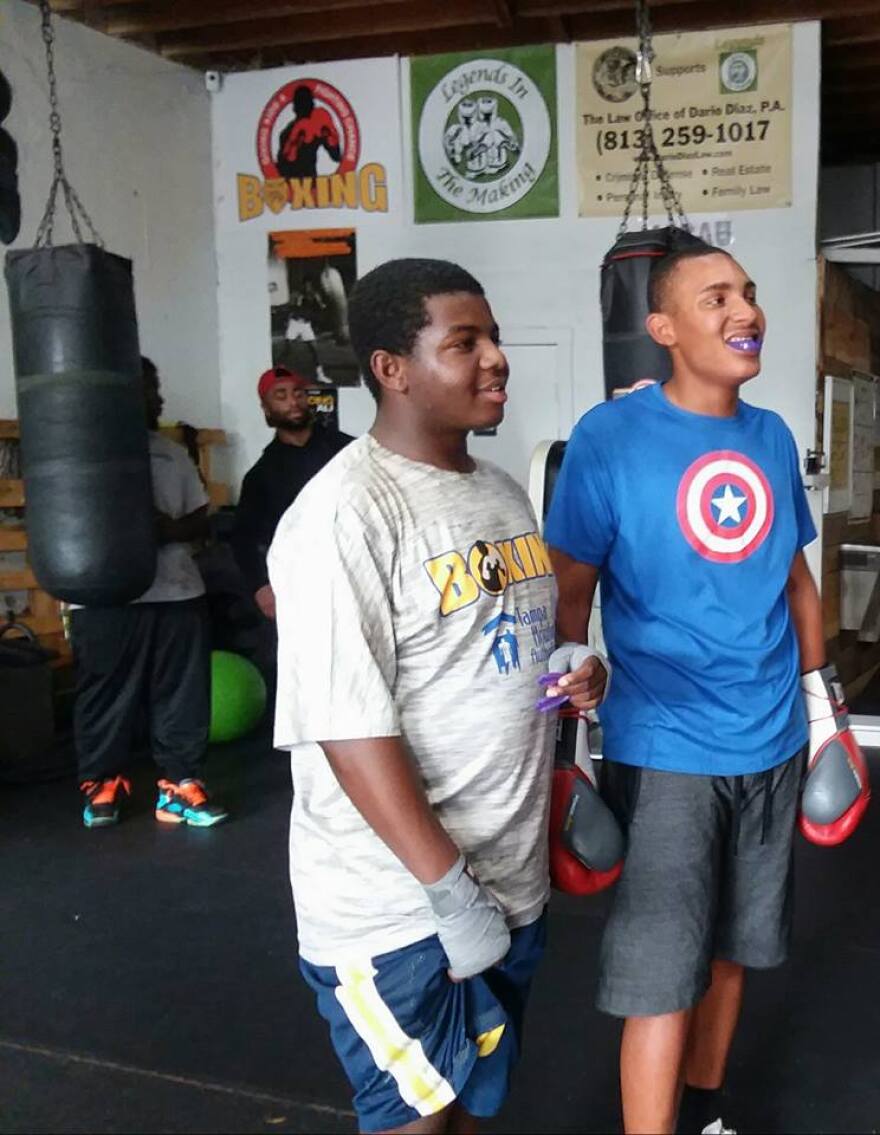In the last four years, police shootings of unarmed young men have created tension between police and communities of color.
As a result, some police departments are taking a hard look at how they can improve relations.
In Tampa, police are breaking down barriers with a program that's taking it one jab and uppercut at a time.
The youth boxing program is a partnership between the Tampa Housing Authority and the city's Police Athletic League. The kids, aged 8 to 17, train for free at Powerhouse Gym in Tampa in 10-week intervals. They are divided into two groups, younger children and teenagers.
Most of the young athletes live in public housing and after school, they get a ride to the gym and a healthy snack before training. The kids get to learn how to safely throw a punch, but they're also being taught lessons they can use outside of the ring. Along the way, they build confidence and self-esteem.
But for Officer Dennis Small, one of several cop coaches, the Police Athletic League program, or PAL, is about more than just sports. The chief goal, is to bridge the gap between cops and kids.
"You have to recognize that a lot of these kids have never interacted with police on a human level,” he said.
That includes his fellow officer Dave Hancock. On the surface he says kids probably see him as just a 'big bald white guy' but the 11-year Tampa police veteran says appearances can be deceiving.
"I came from a very challenging background," he said. "I was an illegitimate kid and was in foster care. I wish I had something like this to turn to when I was a kid."
Hancock has coached kids in all kinds of sports but says boxing provides a unique platform where officers can build trust with at-risk kids in poor communities.
"There is something about combative sports that is a game changer with the kids and with our interaction to them,” he said. “And it opens up their hearts and minds in a way that you just can't get throwing a ball down the field or kicking a ball on the soccer field."

His fellow coach Officer Azariah Israel has first hand knowledge of how important mentoring can be.
"I grew up in a rough neighborhood in Jacksonville," he said. "I went to a PAL boxing program there when I was a kid. PAL pretty much saved me from some options that were easily out there. It gave me something to look forward to. I'm grateful for that."
Police officers help the young contenders learn combinations and stances and how to safely throw a punch, but also about discipline and hard work. And each session ends with the kids sitting cross-legged on the floor for a motivational speech, or, in the jargon used by their cop coaches, the "debrief."
"This whole sport is really a metaphor about life.” Hancock told the kids. “Because sometimes in life you have to fight for what you want. If you get knocked down in trying to achieve your goals are you just going to give up?” "No," he added. "That's when you fight harder."
According to the advocacy group, the National Mentoring Network, one in three at-risk kids aren't getting the kind of support they need to counter challenges. By trading in a bulletproof vest for a pair of gym shorts, Officer Dennis Small says police are connecting with kids.
"If you get knocked down in trying to achieve your goals are you just going to give up? No, that's when you fight harder."
"I've seen enough loss of life from my brother officers, to young men, some of them whose names I can't even remember right now,” he said. “But the instances were enough to fuel me to recognize a community needs this. The more opportunity we have to enlighten some of these young kids and keep them safe, the more likely we can eradicate some of that behavior and hopefully save them from some of those tough experiences that we all go through."
The program seems to have hit its target with at least two participants. 17-year old Desmond Coley is a junior at Chamberlain High School in Tampa.
"They teach us, like, the back story,” he said while getting ready to spar at Legends Boxing Club in West Tampa. “Like, not every cop is bad, and that you can actually be a cop one day and do good for the community."

His classmate, Stephon Mosely, also 17, said the coaches check in with the kids even outside of the gym. "They make sure we are on the right track," he said. "They check your grades and make sure you're doing good in school."
The boxing program may last just 10 weeks, but Small says he tells his fellow officers, that the impact will likely last much longer.
"It may not come out today,” he said. “But years from now, you'll come to understand that you very well may have been the catalyst to change the mindset of an entire community based off of the actions of that one person that you were able to impress early on in his or her life."
And, he says, if one of these young boxers manages to develop a pretty mean right hook along the way, that's all the better.







